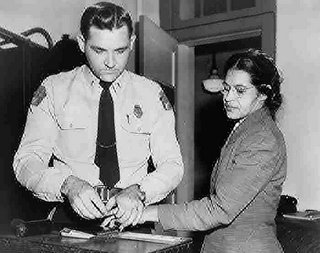
On this day in 1955 Rosa Parks, a black seamstress, in Montgomery, Alabama refused to give up her seat on a racially segregated bus to a white man. As the story goes Parks' defiance of the law was completely innocent. "I was just tired from shopping," she said, "I had my sacks and all, and my feet hurt." She was arrested and fined ten dollars. Outrage over her unjust treatment inspired a young local black minister, Martin Luther King, Jr,. to organize a mass boycott of the Montgomery bus system, and from this flowed the civiil rights movement that secured full liberty for America's oppressed minorities.
So goes the great founding myth of the Civil Rights movement, and it is an inspiring story that embodies a profound poetic truth. America in the 1950s embodied in its laws and customs practices that were horribly antithetical to its dominant political ideology. Disrimination against racial and ethnic minorities was, and was recognized by most Americans to be, a terrible injustice.
Historians have pointed out numerous inaccuracies in the myth. Ms. Parks was hardly the innocent seamstress she claimed to be. She was a seasoned activist who had worked for the NAACP for more than twelve years, and she had been schooled in civil disobedience and community organizing tactics in workshops at Myles Horton's Highlander Folk School. The bus boycott had already been in the works before her action. Most importantly, a focus on Ms. Parks and Dr. King ignores the numerous protests and individual actions against unjust race laws that had been going on for decades. And, by focusing exclusively on local community action it completely ignores the far more important actions and decisions being taken by white elites within the nation's political and legal systems. Earl Warren and Dwight Eisenhower did far more to bring about the end of segregation than did any of the celebrated protesters.
Still, founding myths have great utility. They form a powerful basis for building and maintaining community solidarity and they legitimize collective actions based on that solidarity. Ms. Parks' story has been an inspiration for millions over the course of the past half century and more.
Recently, scholars like Walter Williams and John McWhorter have begun to question the utility of that myth and the victimization/protest model it sustains [see for instance here and here]. And, now that Ms. Parks and the generation that built that myth are passing from the scene, it will probably lose much of its salience and that will open the way for a general reassessment by historians of the role of the Civil Rights reform in twentieth-century America. That will be an exciting and no doubt contentious enterprise, and those brave souls who undertake it will be forced as all who struggle to make sense of the human story do, to consider where lies their professional loyalty -- to the Rankean ideal of history as it happened, or to the utilitarian ideal of a usable past.
No comments:
Post a Comment